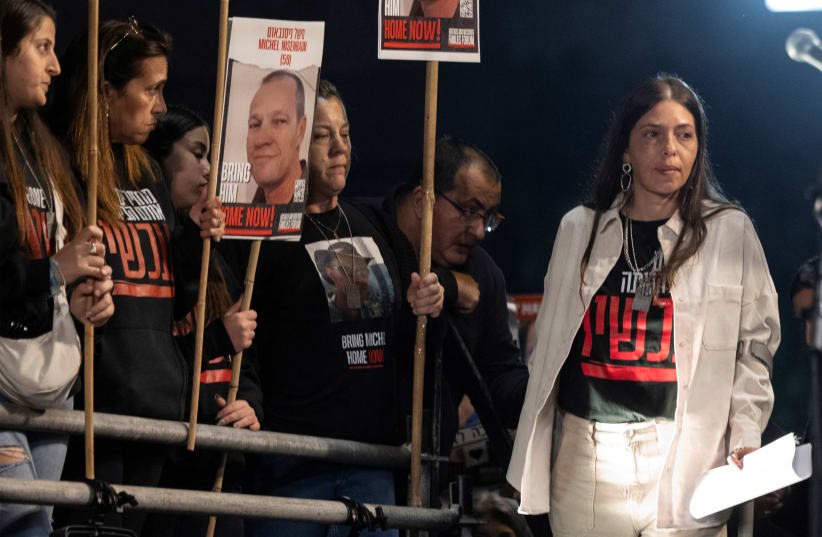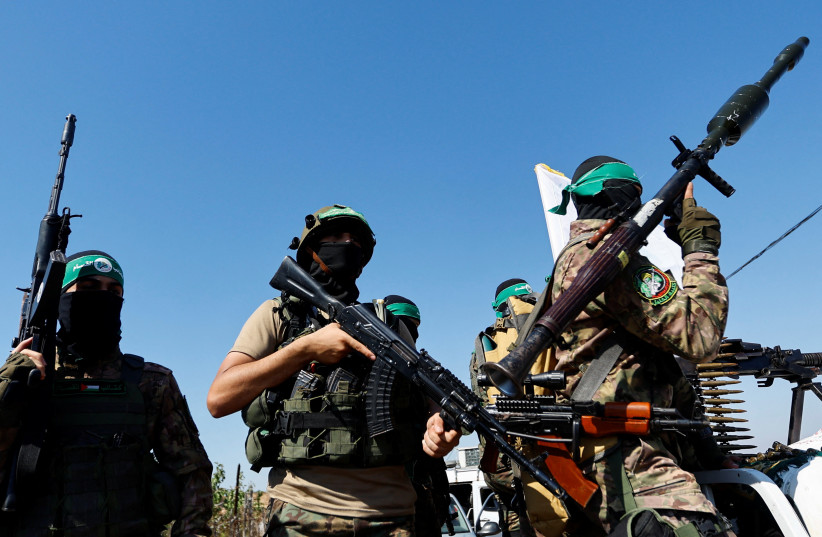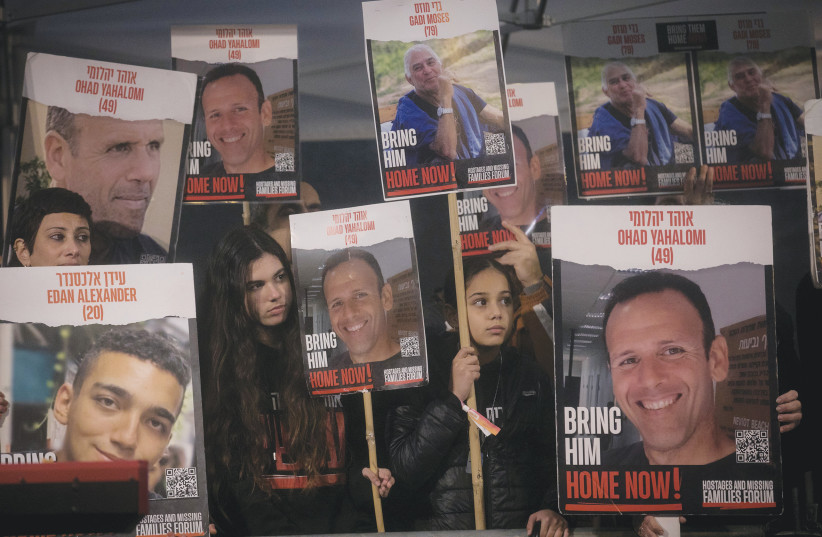Moran Stella Yanai recalled the brutality of her kidnapping to Gaza by Hamas terrorists on October 7 from the Nova Music Festival in an interview published on Saturday with the Washington Post.
Moran had gone to the festival to sell her handmade jewelry, a site which was her biggest venue yet. She had hoped it would boost her career.
In the morning of October 7, as terrorists rampaged through the site of the rave, Moran tried to escape, and for five hours, she ran or walked across a desert landscape and through potato fields, she told the Post, while sending voice messages to her parents as she was sure she would die.
Eventually, she ran into a group of terrorists, whom she convinced she was Arab, using her limited knowledge of Arabic and pointing at the necklace she was wearing. The necklace had her middle name in Arabic letters, a gift from a friend in Egypt.
This group of terrorists live-streamed a video of Moran begging for her life in a ditch. In the livestream, one man refers to her as “one of the Jewish dogs.”
After they let her go, she ran into another group of gunmen and used the same tactics to negotiate her release.
After this, she climbed a thin tree to find a place to hide but fell and fractured her ankle in two places. While limping, she told the Washington Post that she encountered a larger and more organized group of terrorists, 13 in total, who captured her.
Moran said that they ripped off most of her jewelry and packed her into a stolen Israeli car.
She told the Post that from then on, and throughout her captivity, she was very much aware of her body and its vulnerabilities.
While in the car, the terrorists laid her body across their laps, she thought, similar to a hunted animal.
Throughout the car ride, they beat her. When she tried to close her eyes, the group’s leader pulled her hair and forced her to keep her eyes open, watch the gunmen as they glared at her, and see the Gazans line the streets celebrating upon her entry into the territory.
Someone tried to strike her on the head as her captors transferred her from the car to a hospital, she recounted.
“Welcome to Gaza,” the group’s leader told her.
“They felt like they had won a prize,” Moran recalled, the Washington Post reported. “It was the biggest party I’ve ever seen.”
At the hospital, men surrounded her and ripped off her shoes, emptied her pockets, and took her jewelry. The doctor who treated her spoke Hebrew, however “he just smiled at me. That’s like a horror movie,” she said. “That was the moment I made the switch in my head, and I understand that I am in a very bad situation. From then on, it was — survival, commence.”
The doctor inspected her and put a cast on her ankle within minutes.
While in captivity
During one location transfer between hideouts, her guards tore off her cast and forced her to walk down six flights of stairs in high heels too large for her feet. Even though she told them she was in pain, they still told her to continue. Limping was not allowed. She told the Washington Post that she swallowed the pain and reminded herself that she must choose her battles carefully in this situation.
She moved several times from house to house during her captivity, her guards changing each time. She depended on them for survival and was scared of them.
“They didn’t rape me, they didn’t touch me,” she told the Washington Post. However, other hostages she met in captivity told her in confidence about the sexual abuse they encountered in captivity.
“Their stories broke me a little bit,” she said. “But they also gave me so much strength to fight even harder for my brothers and sisters, to get them home.”
Regarding her experience with her guards, Moran said her captors were always in sight and slept beside her and other hostages. They were even present when she went to the bathroom.
Her guards told her her family had forgotten about her and that there was no country for her to return to. They told her the neighbors would kill her if she made too much noise and that the Israel Air Force wanted her dead.
On her second day in captivity, a rocket shattered a window in the room she was held in.
Moran said she tried to prepare herself for death or sexual violence, for which she became more anxious about every time she moved to a new hideout.
The guards would inspect hostages’ bodies for “IDF radio chips.” When they demanded she remove her pants, Moran said no, telling them it is forbidden in Islam.
After they insisted, she doubled down, and the men would back down.
In the first house she was kept in, visitors, including women and children, came to star at her and listen to stories created by the gunmen about her. They would later recount the stories to her in broken English. They told them she was an Arab who had betrayed her country and been recruited to the IDF.
Throughout her captivity, she was forbidden to beg, speak audibly, cry, or express any emotion unless asked to do so.
In one location where she was held, guards forced her to rest her face between her hands, pout like “a lost little girl,” and use a soft, high-pitched voice when asking for food or water in a choreographed performance. She recalled that the guards laughed. “They used us as a game,” she added.
In her fourth place that she was kept in Gaza, Moran was held with Noa Argamani. In an interview with Tablet Moran had in May, she said that at first, when Noa spoke to her, she didn't even recognize her, until she saw her stretch.
Moran and Noa had trained at the same studio in Beersheba, so Moran recognized the way she moved her body. When Moran was moved from that location, she gave Noa a hug, although it was forbidden.
In her last week of captivity, she was moved to a location where another hostage, Itay Svirsky, was located. They slept on mattresses next to each other, Moran revealed to Tablet.
One night, Hamas terrorists woke them up, and told Itay to come with them. The terrorists pointed at Moran and told her, "You stay." She told Tablet that upon his departure, Moran told Itay to write to her, and he asked her to do the same. They then smiled at each other, and she told him, “Itay, just remember that you are one of kind, one of the most special men I’ve ever known,” according to her testimony in Tablet.
In January, Hamas announced Itay to be dead along with Yossi Sharabi, through a video featuring Argamani, where the 26-year-old reported the death of her fellow hostages. Argamani remains alive and in Hamas captivity.
Moran's release
When Moran was released from captivity in November, she discovered she was allergic to the lice that had infested her scalp. She had lost over 7.7 kilograms and is now half deaf from the explosions.
She also began physical therapy for her ankle and was diagnosed with complex regional pain syndrome, she said. The Israeli hospital that treated her told her that the quick treatment on her ankle in Gaza had complicated her recovery.
In mid-January, Moran met with 150 senior CEOs from the world economy in Davos, Switzerland. She told the audience, "We cannot accept the possibility of being kidnapped from a music festival and not returning from it as a normal possibility. Because if not all the hostages return, every citizen should now be afraid to dance at festivals!"
Moran told the Washington Post that she is speaking out because it feels like a duty to speak for those who are still held hostage.
“They cannot defend themselves in there,” Moran said. “I want my sisters and brothers out of this hell.”


